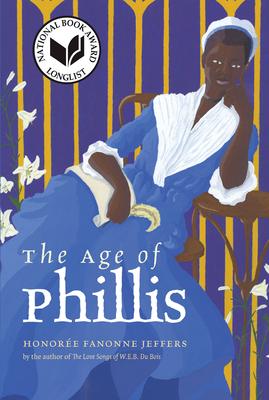
NAACP Image Award Winner for Outstanding Literary Work for Poetry
2020 National Book Award for Poetry, Longlist
2020 LA Times Book Award Finalist
In 1773, a young, African American woman named Phillis Wheatley Peters published a book of poetry that challenged Western prejudices about African and female intellectual capabilities. Based on fifteen years of archival research, The Age of Phillis, by award-winning writer Honore Fanonne Jeffers, imagines the life and times of Wheatley: her childhood in the Gambia, West Africa, her life with her white American owners, her friendship with Obour Tanner, and her marriage to the enigmatic John Peters. Woven throughout are poems about Wheatley's "age"--the era that encompassed political, philosophical, and religious upheaval, as well as the transatlantic slave trade. For the first time in verse, Wheatley's relationship to black people and their individual "mercies" is foregrounded, and here we see her as not simply a racial or literary symbol, but a human being who lived and loved while making her indelible mark on history.
mothering #1
Yaay, Someplace in the Gambia, c. 1753
after
the after-birth
is delivered
the mother stops
holding her breath
the mid-wife gives
what came before
her just-washed pain
her insanity pain
an undeserved pain
a God-given pain
oh oh oh pain
drum-talking pain
witnessing pain
Allah
a mother offers
You this gift
prays You find
it acceptable
her living pain
her creature pain
her pretty-little-baby
pain
NAACP Image Award Winner for Outstanding Literary Work for Poetry
2020 National Book Award for Poetry, Longlist
2020 LA Times Book Award Finalist
In 1773, a young, African American woman named Phillis Wheatley Peters published a book of poetry that challenged Western prejudices about African and female intellectual capabilities. Based on fifteen years of archival research, The Age of Phillis, by award-winning writer Honore Fanonne Jeffers, imagines the life and times of Wheatley: her childhood in the Gambia, West Africa, her life with her white American owners, her friendship with Obour Tanner, and her marriage to the enigmatic John Peters. Woven throughout are poems about Wheatley's "age"--the era that encompassed political, philosophical, and religious upheaval, as well as the transatlantic slave trade. For the first time in verse, Wheatley's relationship to black people and their individual "mercies" is foregrounded, and here we see her as not simply a racial or literary symbol, but a human being who lived and loved while making her indelible mark on history.
mothering #1
Yaay, Someplace in the Gambia, c. 1753
after
the after-birth
is delivered
the mother stops
holding her breath
the mid-wife gives
what came before
her just-washed pain
her insanity pain
an undeserved pain
a God-given pain
oh oh oh pain
drum-talking pain
witnessing pain
Allah
a mother offers
You this gift
prays You find
it acceptable
her living pain
her creature pain
her pretty-little-baby
pain
Paperback
$16.95